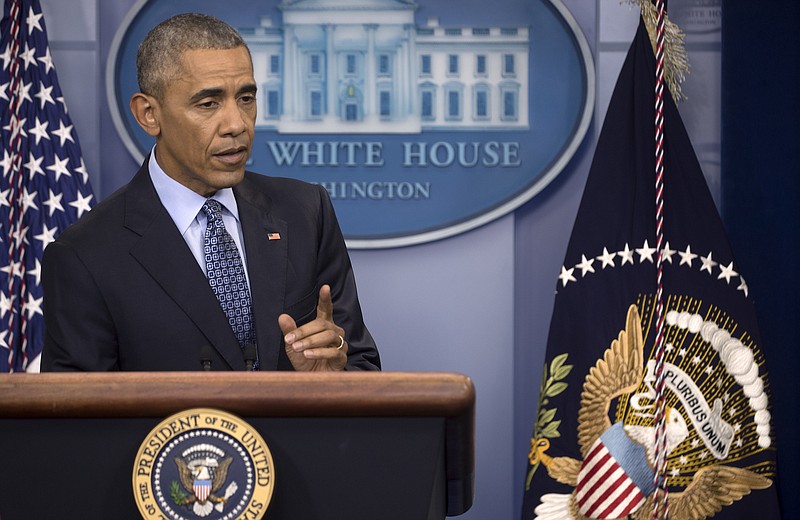Maybe it was Obama
Team Clinton has blamed everything and everyone but the candidate for Hillary Clinton's loss in the 2016 presidential election, but the blame-sharing continues. This week it came from U.S. Rep. Keith Ellison, D-Minn., the deputy chairman of the Democratic National Committee, and the target was former President Barack Obama.
"Barack Obama could have been a better party leader," he said at an event at the University of Minnesota last week, "and I think the fact that he wasn't has put his legacy in jeopardy.
"His true legacy is in danger," Ellison added, "and I think he can't say that he wasn't part of those losses. I mean, who else?"
The second-in-command to DNC Chairman Tom Perez was an early Obama backer but supported Sen. Bernie Sanders, I-Vt., in the 2016 Democratic primary.
In total, Democrats lost 1,042 state and federal legislative seats, governorships and the presidency during Obama's tenure in office.
Booking their future
Publishers pay their money and take their chances, but recent tomes by the 2016 Democratic ticket of Hillary Clinton and Tim Kaine and by Democratic New York Gov. Andrew Cuomo haven't fared so well.
Clinton and Kaine got $14 million for their campaign blueprint book "Stronger Together," and it was recently reported - from his released tax return - that Cuomo earned $783,000 for his 2014 autobiography "All Things Possible: Setbacks and Success in Politics and Life."
Clinton and Kaine sold 2,912 copies of their book the first week, but sales fell drastically after that. If they even sold 4,000 total copies, they would split $3,500 for each book.
Cuomo, according to tracking company NPD BookScan, has sold 3,200 copies (from an announced initial press run of 200,000 by HarperCollins), a take of approximately $245 per book, but his 2016 tax return showed he more than doubled his income from royalty payments from the 3-year-old book in 2016, according to the Buffalo News.
The New York governor's office would only say the publisher had a "contractual obligation" to make the 2016 payment.
But nice work if you can get it.
Petty games
The New York Times thought it had another piece of minutia to grind in the eye of President Donald Trump last week - the number of members of the New England Patriots who visited the White House this year following their Super Bowl victory compared to the number who visited in 2015 when Barack Obama was president.
The Times tweeted out two pictures, showing this year's smaller crowd, the assumption, of course, being the Patriots don't care for Trump.
The Patriots called the newspaper's hand, though. Although the team already had tweeted a photo comparable to the one the Times used from 2015, the one the Times used for comparison from 2017 was players only and no staff. The photos, the team said, "lack context." The truth, the Patriots said, was that 36 players attended in 2015 and 34 in 2017.
The Times, to its credit, did post an update on Twitter.
Academic, uh, freedom
Substitute the names Obama or Wall Street Journal reporter Daniel Pearl for Trump, and imagine how you'd feel about the University of Alaska Anchorage displaying, as it is currently doing, a painting of nude actor Chris Evans holding the severed head of the president of the United States.
Pearl, of course, had his head severed by members of al-Qaida, who released the footage of the slaughter. Evans has openly said he despises Trump.
Assistant professor Thomas Chung, who said he "spent days just weeping" after Trump was elected, created the painting - which also depicts a 1960s-era Hillary Clinton clinging to Evans' leg - for a faculty art show.
Chung generously said he was hesitant about submitting the painting but did so hoping to generate conversation. "I think even students that might be pro-Trump supporters could benefit from having a conversation with me about why I feel this way - why I painted this," he said.
The professor, though, said he "would never talk about my own political beliefs to my students" or "make them feel uncomfortable."
A former UAA professor, Paul R. Berger, who identifies himself as a conservative, said he understands the painting from a "freedom of expression" but feels "public funding of our university system" might be another consideration in the matter.
